Items filtered by date: May 2023
Women and Gout
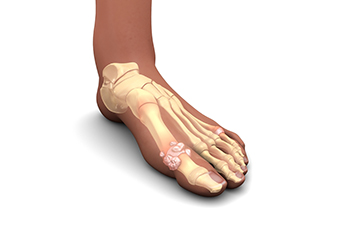
The majority of people who are affected by gout are men. However, it can also happen to women who are past menopausal age and may result due to a lack of estrogen. Gout is caused by excess uric acid levels in the body, which may increase after a woman reaches menopause. Many people associate gout with eating foods that have high levels of purines. These foods include shellfish, red meat, and drinks containing large amounts of sugar. Gout has been known to be a man’s disease as they had these types of eating habits centuries ago. Over the years, women have kept their gout attacks hidden from society, possibly from fear of being labeled as indulging in excess food and drink. Gout can cause severe pain and discomfort and generally affects the big toe. Uric acid will cause crystals to form in the joints of the big toe, which may result in extreme pain, redness, and swelling. Gout patients require the expertise of a podiatrist, and it is suggested this type of doctor be contacted to provide the correct treatment options for you.
Gout is a painful condition that can be treated. If you are seeking treatment, contact Jim Maxka, DPM from South Penn Foot & Ankle Associates. Our doctor will treat your foot and ankle needs.
What Is Gout?
Gout is a form of arthritis that is characterized by sudden, severe attacks of pain, redness, and tenderness in the joints. The condition usually affects the joint at the base of the big toe. A gout attack can occur at any random time, such as the middle of the night while you are asleep.
Symptoms
- Intense Joint Pain - Usually around the large joint of your big toe, and it most severe within the first four to twelve hours
- Lingering Discomfort - Joint discomfort may last from a few days to a few weeks
- Inflammation and Redness -Affected joints may become swollen, tender, warm and red
- Limited Range of Motion - May experience a decrease in joint mobility
Risk Factors
- Genetics - If family members have gout, you’re more likely to have it
- Medications - Diuretic medications can raise uric acid levels
- Gender/Age - Gout is more common in men until the age of 60. It is believed that estrogen protects women until that point
- Diet - Eating red meat and shellfish increases your risk
- Alcohol - Having more than two alcoholic drinks per day increases your risk
- Obesity - Obese people are at a higher risk for gout
Prior to visiting your podiatrist to receive treatment for gout, there are a few things you should do beforehand. If you have gout you should write down your symptoms--including when they started and how often you experience them, important medical information you may have, and any questions you may have. Writing down these three things will help your podiatrist in assessing your specific situation so that he or she may provide the best route of treatment for you.
If you have any questions, please feel free to contact our office located in Hanover, PA . We offer the newest diagnostic and treatment technologies for all your foot care needs.
Pregnancy Causes Changes to the Feet
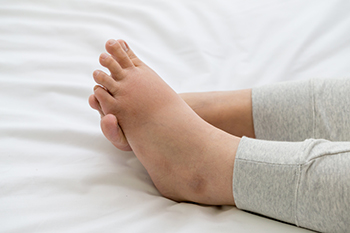
The entire body changes during pregnancy, and the feet are no exception. Many women notice their feet have grown, which may be attributed to pregnancy hormones the body produces. As the pregnancy progresses, the feet may become swollen, and the arches may flatten as additional weight is gained. Relief may be found when shoes that are worn have a low heel and healthy foods are consumed. It is helpful to refrain from eating salty foods, and frequently elevating the feet may reduce the swelling. Swollen feet may also be a symptom of poor circulation, which may happen from the body recirculating extra fluid that is needed by the growing fetus. It is beneficial to stay as active as possible, drink plenty of water daily, and sleep on the left side. If you have additional questions about how pregnancy can affect the feet, it is suggested that you consult with a podiatrist who can address any concerns you may have.
Pregnant women with swollen feet can be treated with a variety of different methods that are readily available. For more information about other cures for swollen feet during pregnancy, consult with Jim Maxka, DPM from South Penn Foot & Ankle Associates. Our doctor will attend to all of your foot and ankle needs.
What Foot Problems Can Arise During Pregnancy?
One problem that can occur is overpronation, which occurs when the arch of the foot flattens and tends to roll inward. This can cause pain and discomfort in your heels while you’re walking or even just standing up, trying to support your baby.
Another problem is edema, or swelling in the extremities. This often affects the feet during pregnancy but tends to occur in the later stages.
How Can I Keep My Feet Healthy During Pregnancy?
- Wearing orthotics can provide extra support for the feet and help distribute weight evenly
- Minimize the amount of time spent walking barefoot
- Wear shoes with good arch support
- Wear shoes that allow for good circulation to the feet
- Elevate feet if you experience swelling
- Massage your feet
- Get regular, light exercise, such as walking, to promote blood circulation to the feet
If you have any questions please feel free to contact our office located in Hanover, PA . We offer the newest diagnostic and treatment technologies for all your foot and ankle needs.
Orthotics May Help Abnormal Foot Structure
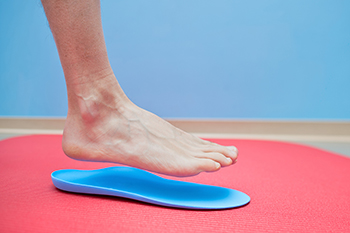
Orthotics are devices placed inside shoes that can correct abnormal foot structures. The feet carry an individual’s weight, and foot pain can cause the entire body to feel fatigued. Custom-made orthotics are unique for your foot needs and are constructed to relieve specific foot problems. They are successful in supporting the arches and can help to realign the feet and ankles. The majority of orthotics offer adequate shock absorption which is often lacking in people who have flat feet. Many people have feet that overpronate, meaning the feet roll inward. Overpronation can happen for various reasons, and orthotics may be helpful for this ailment. If you are considering purchasing orthotics, it is suggested that you consult with a podiatrist who can provide expert advice to help you determine which type is best for you.
If you are having discomfort in your feet and would like to try orthotics, contact Jim Maxka, DPM from South Penn Foot & Ankle Associates. Our doctor can provide the care you need to keep you pain-free and on your feet.
What Are Orthotics?
Orthotics are inserts you can place into your shoes to help with a variety of foot problems such as flat feet or foot pain. Orthotics provide relief and comfort for minor foot and heel pain but can’t correct serious biomechanical problems in your feet.
Over-the-Counter Inserts
Orthotics come in a wide variety of over-the-counter inserts that are used to treat foot pain, heel pain, and minor problems. For example, arch supports can be inserted into your shoes to help correct overarched or flat feet, while gel insoles are often used because they provide comfort and relief from foot and heel pain by alleviating pressure.
Prescription Orthotics
If over-the-counter inserts don’t work for you or if you have a more severe foot concern, it is possible to have your podiatrist prescribe custom orthotics. These high-quality inserts are designed to treat problems such as abnormal motion, plantar fasciitis, and severe forms of heel pain. They can even be used to help patients suffering from diabetes by treating foot ulcers and painful calluses and are usually molded to your feet individually, which allows them to provide full support and comfort.
If you are experiencing minor to severe foot or heel pain, it’s recommended to speak with your podiatrist about the possibilities of using orthotics. A podiatrist can determine which type of orthotic is right for you and allow you to take the first steps towards being pain-free.
If you have any questions please contact our office located in Hanover, PA . We offer the newest diagnostic and treatment technologies for all your foot and ankle needs.
Do Your Child's Feet Hurt?
Adults Who Have Flat Feet
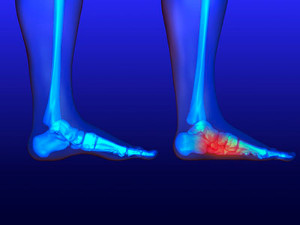
Patients who have flat feet are lacking an arch, which is noticeable while standing up. It is also referred to as fallen arches or pes planus, and the majority of babies are born with this condition. The baby's arch will gradually form as the ligaments and tendons in the leg become tighter, and will be fully developed during the teenage years. In a small percentage of adults the arch does not develop, and this may be caused by an illness or injury. It may also happen from genetic reasons and may be more prevalent as the aging process occurs. Obesity may significantly contribute to having flat feet, in addition to rheumatoid arthritis and diabetes. Patients may notice their feet constantly ache, and mild relief may be found when custom-made orthotics are worn and specific stretches are performed. If you are afflicted with flat feet, it is suggested that you are under the care of a podiatrist who can guide you toward management techniques.
Flatfoot is a condition many people suffer from. If you have flat feet, contact Jim Maxka, DPM from South Penn Foot & Ankle Associates. Our doctor will treat your foot and ankle needs.
What Are Flat Feet?
Flatfoot is a condition in which the arch of the foot is depressed and the sole of the foot is almost completely in contact with the ground. About 20-30% of the population generally has flat feet because their arches never formed during growth.
Conditions & Problems:
Having flat feet makes it difficult to run or walk because of the stress placed on the ankles.
Alignment – The general alignment of your legs can be disrupted, because the ankles move inward which can cause major discomfort.
Knees – If you have complications with your knees, flat feet can be a contributor to arthritis in that area.
Symptoms
- Pain around the heel or arch area
- Trouble standing on the tip toe
- Swelling around the inside of the ankle
- Flat look to one or both feet
- Having your shoes feel uneven when worn
Treatment
If you are experiencing pain and stress on the foot you may weaken the posterior tibial tendon, which runs around the inside of the ankle.
If you have any questions please feel free to contact our office located in Hanover, PA . We offer the newest diagnostic and treatment technologies for all your foot and ankle needs.
Facts About Achilles Tendon Ruptures
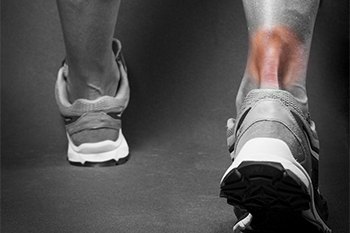
Pain in the back of the heel often indicates a problem with the Achilles tendon, and there are numerous ways this can occur. The top three risk factors for tearing or rupturing this strong tendon are training too hard, pushing off the ground with great force, or a rapid change of direction. While these factors are mainly related to athletic activities, many others can contribute to an Achilles tendon injury. Among them are wearing high heels, having tight or weakened calf muscles, and overpronating when you walk or run. Having high arches, aging, and some types of arthritis can also put you at risk. Ankle instability, taking certain antibiotic medication, and changing the type of surface for an activity are additional risk factors. If you are experiencing any form of ankle pain in the back of the heel that inhibits the completion of your daily activities, it is suggested that you make an appointment with a podiatrist who can discover the cause and treat it.
Achilles tendon injuries need immediate attention to avoid future complications. If you have any concerns, contact Jim Maxka, DPM of South Penn Foot & Ankle Associates. Our doctor can provide the care you need to keep you pain-free and on your feet.
What Is the Achilles Tendon?
The Achilles tendon is a tendon that connects the lower leg muscles and calf to the heel of the foot. It is the strongest tendon in the human body and is essential for making movement possible. Because this tendon is such an integral part of the body, any injuries to it can create immense difficulties and should immediately be presented to a doctor.
What Are the Symptoms of an Achilles Tendon Injury?
There are various types of injuries that can affect the Achilles tendon. The two most common injuries are Achilles tendinitis and ruptures of the tendon.
Achilles Tendinitis Symptoms
- Inflammation
- Dull to severe pain
- Increased blood flow to the tendon
- Thickening of the tendon
Rupture Symptoms
- Extreme pain and swelling in the foot
- Total immobility
Treatment and Prevention
Achilles tendon injuries are diagnosed by a thorough physical evaluation, which can include an MRI. Treatment involves rest, physical therapy, and in some cases, surgery. However, various preventative measures can be taken to avoid these injuries, such as:
- Thorough stretching of the tendon before and after exercise
- Strengthening exercises like calf raises, squats, leg curls, leg extensions, leg raises, lunges, and leg presses
If you have any questions please feel free to contact our office located in Hanover, PA . We offer the newest diagnostic tools and technology to treat your foot and ankle needs.

